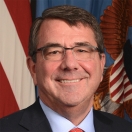
This week in Brussels, I convened the first-ever meeting of defense ministers from 27 other countries involved in the military coalition to defeat ISIL.
As I explained to my counterparts, when ISIL’s continued existence threatens not only the lives of the Iraqi and Syrian people, but also the security of our own citizens, all of our nations have a responsibility to accelerate this fight. There must be no free riders.
The United States will continue to lead this coalition, providing it with a campaign plan and a unique set of capabilities. We are also prepared to do more to hasten ISIL’s lasting defeat and are actively taking steps to do so. At the same time, the campaign has enduring requirements that other nations have the capability to meet.
Last December, I reached out personally to dozen of defense defense ministers to urge them to consider filling critical military and non-military needs in the campaign.
"Nearly 90 percent of the countries participating in the coalition's military campaign have either stepped up their role or committed to do so in the coming days."
I am gratified to report that coalition members responded to our challenge. This week, Canada announced a commitment to triple its training mission in Northern Iraq and double its intelligence efforts throughout the region. The Netherlands recently expanded its current air campaign over Iraq to include targets in Syria, and is contributing funds for medical assistance and rebuilding. In Brussels, I received additional commitments to the fight from the Czech Republic, Poland, Romania, and Denmark pending final approval by their respective parliaments.
Contributions from Gulf nations, both in delegitimizing ISIL’s toxic ideology and confronting ISIL fighters on the ground, are particularly important to our larger effort. On Thursday, Saudi Arabia agreed to expand its role in the Coalition air campaign and provide additional support on the ground. Today, the United Arab Emirates said it will do the same. I appreciate both countries willingness to help us accelerate the campaign.

These new additions add to the substantial existing contributions from countries like Australia, France, Italy, Germany, and the United Kingdom which have significantly increased their efforts since the attacks in Paris, Istanbul, and beyond this fall.
In sum, nearly 90 percent of the countries participating in the coalition's military campaign have either stepped up their role or committed to do so in the coming days. Their decisions to expand air operations, provide additional trainers, logistical support, reconstruction assistance, or some other contribution will all help the coalition intensify the counter-ISIL campaign.
Our objectives are clear. We must destroy the parent tumor in Iraq and Syria by collapsing ISIL’s grip on its power centers in Mosul and Raqqa. That will destroy the false notion that this barbaric group maintains any semblance of a state. At the same time, we must confront the metastasis of the cancer. That means being prepared to confront ISIL and its offshoots in Libya, Afghanistan, and wherever it spreads. Since no nation is immune to this threat, we must do everything we can to protect our homelands.
"Any nation that cares about the safety of its people or the future of civilization must engage in this fight."
Any nation that cares about the safety of its people or the future of civilization must engage in this fight. We need the full involvement of every government, not just every military. That means political engagement to help craft the long-term security architecture for the region. It means – in today’s connected world – cutting off ISIL’s finances, stemming the flow of foreign fighters, and countering ISIL’s wicked messaging on social media and elsewhere. And there’s even more that can be done. Humanitarian and reconstruction aid can be just as powerful a weapon in this fight as any precision guided munition.
I'm very pleased that so many nations have stepped up and answered the call in recent days, and I am encouraged by our meeting. But my challenge to coalition members to accelerate our military campaign will not end in Brussels, any more than America's resolve to lead and make more contributions itself will end there. It will continue.
Indeed, the determination my counterparts brought to our Brussels Ministerial – and the accelerated actions we take against ISIL on the battlefield – must continue so that we can truly deal ISIL a lasting defeat.


